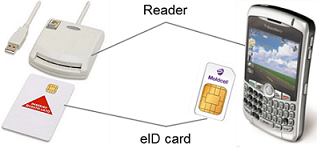As a growing percentage of the world’s population makes greater use of online and digital services, the ability to verify and authenticate users in a secure and convenient manner is becoming an increasingly critical issue for businesses and governments alike.

Identity theft and associated fraud have become an ever-greater burden on society and businesses as many users, regrettably, still take unnecessary risks. The annual cost to businesses worldwide from hacked or compromised information has been estimated at over US$350 billion, whereas the cost to governments – in the form of false tax returns or fraudulent applications for social services – is even more worrying.
Recognising that consumers want the freedom to connect, to log-in, to buy and sell, and to consume – from any location and at any time – without compromising the security of their personal information, a number of Mobile Network Operators are developing solutions that place control back into the hands of the consumer. Working, in many cases, in partnership with governments and other service providers, Operators have begun to explore ways of providing secure and convenient authentication, verification and identity management to their subscribers.
The Benefits of Mobile Identity
Mobile Identity has the potential to deliver secure, adaptive and user-friendly identity management solutions across not only the digital economy, but also many “bricks and mortar” settings. In the physical world, we use government or service provider-generated certificates, cards or other documents to prove our identity. In the digital world, verification of a person’s identity cannot rely on the physical presence of the individual, but instead requires some form of identity verification that assures both the service provider and the user that the information provided is accurate and safe from abuse.
eID Authentication
- Is the electronic equivalent to showing an ID card in the physical world
- Provides high level of security by using 2 factors of authentication: a device (the smart card) and a code

Mobile eID
- Works on the same principles as eID, but does not require smart card readers or a computer
- The SIM is the smartcard and the phone is the reader
- Mobile penetration in many countries is growing rapidly
What is the GSMA doing?
Mobile Network Operators are extremely well positioned to take a leading role in the arena of digital identity management, as the provision of secure, authenticated services backed by diligent fraud prevention measures has long been an established part of daily business for operators from the outset. Research suggests that Mobile Network Operators are perceived to be amongst the most trustworthy of enterprises, and consumers would be prepared to share personal information with them, particularly in return for better services and levels of service.
The GSMA Mobile Identity programme has been established to support mobile operators globally in understanding and unlocking the potential of electronic and mobile identity. As part of this mandate, the programme is currently conducting research on the needs of consumers and businesses in key markets to understand and define solutions best suited to the address these challenges.
The programme is looking to engage with governments, NGOs and the broader mobile ecosystem to build a community that can share best practices and create robust, coordinated identity solutions that leverage the ubiquity of mobile technology. This includes being aware of and prepared for the opportunities and challenges of existing and upcoming legislative and regulatory changes.
Notice: GSMA Mobile Identity team will be attending the GSMA LA Plenary Meeting 38 in Mexico and would welcome the opportunity to meet with members from Latin America who will also be there. If you are planning to attend and would like to meet with us and other GSMA members please contact Nick Foggin or Alix Murphy.